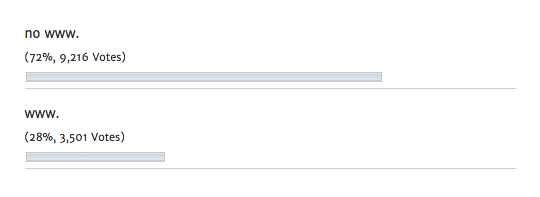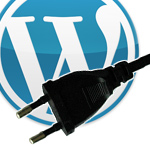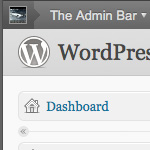Poll: www. or no www.?

This one’s self-explanatory, but a lot has changed so I thought I’d poll one up to see what people think. It seems there are a lot more sites these days without the www. in their canonical URLs, but a lot of big sites continue to include the “www” subdomain (think Google home page). Which one is best? Let’s find out..
In this poll, you’re asked whether you prefer URLs with or without the extra www. subdomain. But you have to choose one or the other — no “other/undecided” votes allowed on this one ;)
Okay, drumroll please..
Poll Results
Do you prefer “www” or no “www” in URLs?

Total Voters: 12,717
30 responses
-
The WWW is nice.
World Wide Web. It just stands as a nice reminder and also kinda feels old school because its been with us from the beginning :)
-
double yew – double yew – double yew – dot – google – dot – com
vs
google – dot – com
Worse is when people go full protocol:
aitch – tee – tee – pee – colon – forward slash – forward slash – double yew – double yew – double yew – dot – google – dot – com
(and yes I know it is not ‘forward slash’, yet this is how I have heard people vocalise it for unknown reasons)
-
Saying ‘www’ in Dutch takes a second =)
-
It is a forward slash. The thing people get wrong all the time is: they love to call a forward slash “a back slash” for some very strange reason.
-
-
Tim Berners-Lee regrets one thing about http–the slashes
http://. All the paper and ink printing those slashes; all the extra hard drives storing those slashes; the work lost because of those two extra keystrokes; the energy wasted transmitting, reading, and displaying those slashes.So, yes, I do prefer to drop the four strokes of www.
And if you’re speaking the individual double-yews… get out of my house.
-
I all for getting rid of the WWW subdomain, removes 4 bytes of data! (Haha) But getting rid of it can give you a bad score of a “Cookieless doamin” in Page Speed.
-
www. is deprecated: no-www.org
-
I have never been a big fan of adding the w’s at the front of a domain. I always remove it, and when I type a domain into my browser, I always leave out the w’s because it saves time.
Because the internet is so widespread, I never see the need for spelling out the w’s when it comes to giving someone a web address, as most people would recognise that it is a website when they get to the .com part of the address.
Best practice I have found is to set the site up to not have the w’s, and force a redirect to the non w’s domain for those who insist on adding the w’s at the start of my domain.
-
I like the WWW, honestly. I like the feel of it. As long as
www.site.comandsite.comgo the same place, it’s really irrelevant at this point.-
Yeah, always best to do one or the other for duplicate content and user experience. A lot of my clients want the www prefix unfortunately, a simple htaccess rule forces one or the other.
-
-
Without www is easier to remember.
-
I like both actually. I guess it depends on how it sounds – sometimes it is better with
www, sometimes without. But I have to admit that I usually omit the ‘www’ when typing address into the browser myself. -
Spelling out “www” is stupid, it’s obvious that the site should work both with and without www, so the question is which should be primary. I personally don’t care what appears in my address bar as long as I can type the shorter version.
However, keep in mind that non-www domains can’t contain CNAME DNS records, meaning you can’t load balance off a different service without changing your DNS hosting to that service (perhaps for round-robin) but some services don’t offer DNS hosting to do that. Google AppEngine is a perfect example of this, as well as most of the other services that allow you to link your domain with a CNAME entry, like WordPress.com, Tumblr, Posterous, …
So to answer your question, I don’t think end users should even care about this :)
~ K
-
We serve both because we have to, but the shortcut is extremely important. Saving the typing/w-barking is one thing, but four characters in print is where the saving is really at.
Of course technically the content lives on a server/container/host that is known as www (the server has a different hostname, but we won’t go there). Our internal network actually has the biggest issue since it’s routing is done trough Active Directory, so it handles the first redirect. Outside interent traffic gets the simple mod_rewrite redirect.
It’s much easier when you don’t have a large internal multi-os-mostly-windows network to deal with, but it did remind the that having that www is a decent reminder of where that stuff truly lives. I won’t be changing my personal no-www ways, but it’s interesting to chew on.
-
I say loose the dubs. I really don’t see the purpose for them and I think “most” of us have evolved past using them.
-
On the web: no www. Anyone typing in a
wwwgets silently redirected to the www-free site.Spoken: no www. Think about how weird you sound saying this out loud.
But in print:
www.example.comlooks nicer thanexample.com, and gives the mental cue to the reader that this is a website in a way thatexample.comdoesn’t.To sum up: Only in print.
-
This guy has it right.
-
-
No w’s. 17 years running.
(And actively advising clients against their inclusion since the beginning.) -
All the web developers and admins should redirect the
www.doman.???to justdomain.???because this will help the Google page rank.-
@sam where did you get that info?
Google doesn’t care about www vs no-www. Why would they? There’s only a problem if you don’t redirect one to the other, then PR is split between
www.domain.com/pathanddomain.com/path, so you lose PR for each one.GWT allows you to set a preference, or you can 301 redirect one to the other (my preference), or you can set
rel="canonical"on all your pages.
-
-
I’d prefer to get rid of triple ‘W’, and get everyone used to it. Minimal protocol brands better and is easier to remember, less typing, more efficient.
-
We don’t need WWW. I have only 2 domains with WWW and 40 without.
-
www is a fosil, sort of like aol, let’s omit it for good
-
I prefer to use non-www domains and 301 direct the www domain to the non-www. It looks cleaner and adds more focus to the domain name itself.
Don’t think I’ve ever typed ‘www’ so many times in one sentence.
-
I had read a post about the inclusion of the WWW and explained that users do not trust the URL without the www. So I voted WWW.
-
Z.Andreas – I’ve seen that before too, and also the reason I voted to have WWW in canonical but allow people to access without it, and have it 301 redirect. I do this for all my clients.
People do trust www more. Simple as that, is a helping factor when trying to convert traffic.
-
Please notice most major websites redirect to the www version. Yahoo, Microsoft, Google, Facebook, but not Twitter (goes along with their shortened 140-character style)
-










